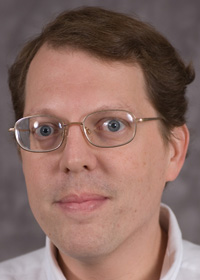
David Bader
Professor and Executive Director of High Performance Computing, Georgia Institute of Technology
David Bader is no stranger to the pages of HPCwire, having been recognized before as a person to watch – and yet his star continues to rise. With the rise of big data, Bader’s work at the intersection where high performance computing meets real-world applications is turning heads. Among other achievements, Bader was the principal investigator in an effort that led to a nearly $2 million dollar grant for researchers at the Georgia Institute of Technology and the University of Southern California to bring supercomputing capabilities into the grasp of tablets, smart phones and other internet-era devices. We caught up with and asked Bader his thoughts on the trends for 2014.
HPCwire: David, you’ve been very prolific in HPC for some time now, with your hand in many cookie jars across the HPC landscape. What can you tell us about the important things you’ll be working on for 2014?
David Bader: It’s an exciting time in High Performance Computing, when we can design and implement real systems for massive data analytics for distilling big data into knowledge. Specifically, we’re excited about streaming graph analytics and their tech transfer to industrial-class problems, and new processors and memory technologies from the leading vendors. The opportunities are vast for moving our processing kernels into emerging memory technologies, for instance, with power-savings advantages.
HPCwire: You’ve told us that you are excited by new accelerator and memory technologies that are coming on to the scene. Can you talk about your vision about the importance of these technologies and what they mean for the future of HPC?
David Bader: In computing, we’ve always considered processors and memory as separate components. However, with accelerator technologies from vendors such as NVIDIA and Intel, and new memory technologies from Micron and IBM, among others, we are changing the fundamental costs in both time and energy for performing key data processing kernels.
Still there will be a challenge of how to design efficient algorithms and program them, but on this novel and heterogeneous architecture. I truly believe we are entering a new age of high performance computing that will change our basic assumptions about the possible!
HPCwire: As you look down the road at 2014 and beyond, what do you see as the most important trends developing that will have an impact now and into the future?
David Bader: The two big trends we hear about are Exascale Computing and Big Data. These terms are more than the current fad– they are trends that definitely impact our future. Exascale computing refers to several key research and engineering challenges in designing supercomputing systems with millions or more of cores, and orchestrating them in a reliable and scalable way to solve real problems.
With Big Data, in addition to building a data warehouse that can hold this massive pile of data, we have to figure out how to change the computing paradigm to ingest this information in all of our applications and perform complex analytics. Both of these trends also require us to think seriously in the years to come about energy-efficiency as a primary constraint in high performance computing.
HPCwire: On a personal note, can you talk about your personal life? Your family, background, any hobbies?
David Bader: Thanks for asking me to tell you a little about myself, because after all, high performance computing is about the people and making our lives better. I’ve just tried to make the world a better place, end suffering, and be happy. All of the academic things that one measures follows instead of being a goal. I’ve just been blessed to have the right paths in life that got me here.
At Georgia Tech, I enjoy working with colleagues and students to make a difference in this world. My daughter Sadie is almost a teenager, and my hobby had been taking her to supercomputing conferences when she was little. Now, I attend her youth circus arts events!
My other hobbies include being vegan and traveling around the world to see other people and cultures.
HPCwire: One last question – is there anything about yourself that you can share that you think your colleagues would be surprised to learn?
David Bader: Maybe the fact my first computer in 1972 was a PDP-11/45, or that I followed around the Grateful Dead.

































